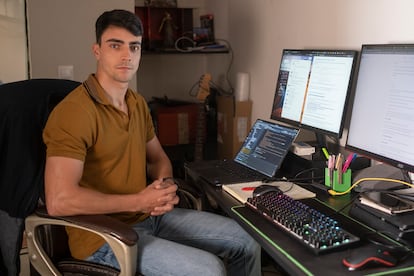The big data boom: ‘I’ve never had to send out a résumé; the offers have just come to me’
The industry is taking off and there are an abundance of openings for engineers, analysts and scientists: ‘There is a lot more work than there are people’

It seems incredible in the current economic climate, but there is a sector in Spain where unemployment is zero and the salaries among the highest in the country. It falls within the information technology sector, where there is a booming specialization: big data. What this industry does is collect, store and analyze the flood of data that people generate every second, whether by uploading a photo to Instagram or searching for a place to eat. Behind every online move we make is a specialized big data team dedicated to studying our preferences, trends and profiles. They are engineers, scientists, programmers and analysts. All of the employees interviewed for this article agreed on one thing: opportunity abounds in big data. “I’ve never had to send out a résumé; the offers have just come to me,” says Daniel Castro Chinco, a big data engineer. Such is the boom in the industry that the Spanish government’s digital transformation agenda includes a priority target for companies that employ big data to increase by 10%, to 25%, over the next five years. Here is an overview of some of the opportunities that exist within the sector.
Big data engineer
Castro, 28, graduated with a degree in Computer Engineering from the University of Seville. He discovered a passion for big data at his first job as a web designer, when he was put in charge of a project that used big data techniques. He decided to specialize in the field and did a Master’s degree in Data Science and Big Data. In March 2021, he landed a job as a big data engineer at Plexus Tech, a software company specializing in data and consulting. Castro oversees the collection, processing and ordering of all the data his company handles, “so another department can take it and do what they need to do with it,” whether that is coming up with a marketing strategy or a business analysis, he explains.
According to Castro, a person in his position should “be curious,” have “analytical skills” and “be able to find patterns in the data.” Companies tend to look for technical and mathematical profiles, like his. Since he completed his master’s degree, Castro has never had to apply for a job. Offers come from the companies themselves, who come across his profile on LinkedIn. “There is a lot more work than there are people and with very good conditions,” he says.

Data scientist
Inés Rodríguez García, 24, studied biotechnology at the Technical University of Madrid. During her degree coursework she was told that the only job she was likely to find after graduating was in a laboratory. Deciding that she would not find that fulfilling, she completed a master’s degree in Bioinformatics applied to health at the National School of Public Health of Spain. “I realized there that what I enjoyed was tinkering with numbers, with the computer, with programming,” she says. Now, García is a data scientist at a multinational specializing in health information technology and clinical research.
Her day-to-day work consists of collecting data from hospitals to understand how each patient has been cared for during their admission. This data includes age, gender and the diagnosis of each patient. “With this information we want the hospital to be able to improve its management processes, for example reducing waiting lists and mortality rates.” García admits she “did not have the right training to work in this field,” because data scientists tend to be statisticians or engineers. Even so, she has been in the sector for over a year and recognizes there is an increasing need for workers specializing in big data, “because at the end of the day it is not only about generating information, but being able to store it and analyze it to make projections,” she says.

Data analyst
Javier Pérez Lafuente studied Law and Business Administration at the University of Zaragoza and started work at Smartme Analytics in 2017 in a marketing role. After a time, though, he became eager to learn more about the big data his company was handling. “I very quickly realized that I was very comfortable with big data issues and that there was a big future in the sector, but I also knew that I clearly lacked training because I had not studied for this,” he says. However, he did not want to pay for a master’s degree so he decided to teach himself by signing up for online courses, many of which were free.
Now Lafuente, 28, is a data analyst and his work consists of drawing conclusions from consumers. “Let’s say there’s a client who wants to know how to use Instagram to get people who don’t usually watch television to do so. I take all the data we get from that app and turn it into information. It’s no longer just data, but we understand it and know how to use it to achieve the end we are after,” he explains. Lafuente has been working at Smartme Analytics for five years and although he has not been looking for another job, he has received around a dozen offers. “It gives me a lot of peace of mind to know there is so much opportunity,” he says.
Solutions engineer
Ana Manzanares Villarán, 31, has a curious job title: solutions engineer. “In reality, my job is to serve as a bridge between the client and my company,” she explains. “It’s a role that combines being technical with a lot of exposure to the customer: understanding what problems they have and how our technology can help them to solve them. It’s not a job that requires specific studies, but rather they are looking for dynamic and flexible people, with a commercial calling.” Since last February, Manzanares has been working for Carto, a company that specializes in geolocation and data. She holds a Geography degree from the University of Seville but says that data has always fascinated her, leading her to learn programming and software languages in her own time.
At Carto, Manzanares takes on all kinds of projects at national and international level, but above all she enjoys those that deal with sustainability. Her role consists of meeting with a client to understand what they are looking for. Then, she carries out proofs of concept, which involves developing a solution for the client based on the relevant data. These solutions tend to be cell phone or web applications. “From there we present it to the customer, get their feedback and then decide on the next steps,” she says.
Tu suscripción se está usando en otro dispositivo
¿Quieres añadir otro usuario a tu suscripción?
Si continúas leyendo en este dispositivo, no se podrá leer en el otro.
FlechaTu suscripción se está usando en otro dispositivo y solo puedes acceder a EL PAÍS desde un dispositivo a la vez.
Si quieres compartir tu cuenta, cambia tu suscripción a la modalidad Premium, así podrás añadir otro usuario. Cada uno accederá con su propia cuenta de email, lo que os permitirá personalizar vuestra experiencia en EL PAÍS.
¿Tienes una suscripción de empresa? Accede aquí para contratar más cuentas.
En el caso de no saber quién está usando tu cuenta, te recomendamos cambiar tu contraseña aquí.
Si decides continuar compartiendo tu cuenta, este mensaje se mostrará en tu dispositivo y en el de la otra persona que está usando tu cuenta de forma indefinida, afectando a tu experiencia de lectura. Puedes consultar aquí los términos y condiciones de la suscripción digital.









































